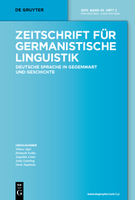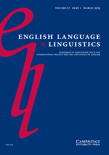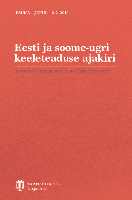
Journal of Greek Linguistics
metrics 2024
Fostering Interdisciplinary Insights in Greek Language Research
Introduction
The Journal of Greek Linguistics, published by BRILL, is a premier platform dedicated to advancing the study of Greek language and its historical and contemporary implications within the broader field of linguistics. With an impact factor recognized in the linguistics community, this journal significantly contributes to the academic discourse surrounding Greek linguistics and its relevance in cultural and social studies. First made open access in 2016, it is now accessible to a global audience, facilitating a collaborative environment for researchers, scholars, professionals, and students alike. The journal is proudly positioned in the Q2 quartile for linguistics and language, reflecting its esteemed standing in the academic community, and it ranks within the top 30% in both the Arts and Humanities and Social Sciences categories according to Scopus. With a focus on the intersection of language, culture, and society, the journal invites contributions that offer new insights and promote interdisciplinary research. The Journal of Greek Linguistics continues to be an essential resource for those engaged in the rich and evolving conversation about the Greek language.
Metrics 2024
 0.17
0.17 0.50
0.50 0.50
0.50 11
11Metrics History
Rank 2024
Scopus
JCI (Web Of Science)
Quartile History
Similar Journals

Cuadernos de Filologia Clasica-Estudios Griegos e Indoeuropeos
Unveiling the Rich Tapestry of Ancient LanguagesCuadernos de Filologia Clasica-Estudios Griegos e Indoeuropeos, published by Universidad Complutense de Madrid, serves as a vital platform in the fields of Classics and Linguistics. With an ISSN of 1131-9070 and an E-ISSN of 1988-2637, this journal showcases rigorous academic research that spans both Greek studies and Indo-European linguistics. Recognized within the Q1 quartile in Classics and the Q2 quartile in Linguistics and Language, it highlights its standing among peers in these disciplines, particularly reflecting its commitment to advancing scholarly conversation. Though currently lacking in Open Access options, its emphasis on quality content ensures it maintains an intellectual influence, as evidenced by its ranking of #112 in Classics and efforts to engage researchers and students alike. The journal's coverage from 2011 to 2024 positions it as a rich historical resource, while its address in Madrid places it at the heart of European classical studies. By offering insights into the fundamental aspects of language, literature, and ancient cultures, Cuadernos de Filologia Clasica remains a critical resource for those seeking to deepen their understanding of the classical world and its enduring linguistic legacies.

Journal of Slavic Linguistics
Connecting Scholars through Slavic Linguistic ResearchJournal of Slavic Linguistics, published by SLAVICA PUBLISHERS, is a key academic resource dedicated to the exploration of Slavic languages and linguistics. Established to provide a comprehensive platform for scholarly research, this journal addresses the intricate dynamics of Slavic phonetics, syntax, semantics, and discourse, making significant contributions to both theoretical and applied linguistics. The journal holds an impact factor that reflects its value in the linguistic community, particularly as it is ranked in the Q4 category in Linguistics and Language for 2023. With a focus on a wide range of topics within the field, the Journal of Slavic Linguistics serves as an essential reference for researchers, educators, and students alike, fostering an appreciation and deeper understanding of Slavic linguistic phenomena. Although currently not an Open Access journal, it remains accessible to a broad audience keen on engaging with contemporary linguistic scholarship.

Voprosy Yazykoznaniya
Advancing the Frontiers of Language ResearchVoprosy Yazykoznaniya, published by the esteemed Russian Academy of Sciences and the State Academy of Humanities (GAUGN), stands as a leading journal in the field of linguistics and language studies. With an impressive Q2 rank in Linguistics and Language for 2023 and a strong position within Scopus rankings, this journal fosters scholarly dialogue and pushes the boundaries of linguistic research by providing a platform for innovative studies, reviews, and analyses. Although not open access, its publication ensures high academic standards and visibility within the global academic community. Researchers, professionals, and students alike can benefit from the rich insights and diverse perspectives presented in this journal, serving as a vital resource for anyone interested in the intricacies of language and its role in society. Operating since 2009 and continuing to 2024, Voprosy Yazykoznaniya is an essential reference point for contemporary linguistic scholarship in the Russian Federation and beyond.

ZEITSCHRIFT FUR GERMANISTISCHE LINGUISTIK
Connecting Theory and Practice in LinguisticsZEITSCHRIFT FUR GERMANISTISCHE LINGUISTIK, published by WALTER DE GRUYTER GMBH, stands as a pivotal resource in the field of linguistics since its inception in 1973. With its ISSN 0301-3294 and E-ISSN 1613-0626, this esteemed journal serves as an essential platform for researchers and academics focused on the nuances of the German language and its linguistic frameworks. Catering to a diverse audience, the journal features high-impact articles and contributions consistent with rigorous academic standards, as evident from its Q1 categorization in Linguistics and Language and its notable rankings in both the Arts and Humanities and Social Sciences domains. The journal's commitment to advancing knowledge in linguistics fosters a scholarly environment conducive to both emerging and established linguists. While not available through open access, ZEITSCHRIFT FUR GERMANISTISCHE LINGUISTIK remains influential, drawing readers keen on exploring developmental and educational paradigms alongside linguistic theories. With a convergence of research that spans until 2024, it represents a comprehensive body of work integral to the evolving landscape of linguistic studies in Germany and beyond.

Studi e Saggi Linguistici
Cultivating a Rich Exchange of Ideas in LinguisticsStudi e Saggi Linguistici is a distinguished academic journal published by EDIZIONI ETS, based in Pisa, Italy. With its ISSN 0085-6827, this journal has established itself as a vital resource in the field of linguistics, particularly noted for its contributions since its inception in 2016. Although currently categorized in the lower quartile (Q4) by the 2023 metrics in the domains of Linguistics and Language within Scopus, it remains a significant platform for innovative research and critical discussions surrounding language studies. Focusing on both theoretical and practical aspects of linguistics, the journal serves as a nexus for scholars and practitioners alike, facilitating a rich interchange of ideas and knowledge in a rapidly evolving discipline. As an invaluable publication for researchers, professionals, and students, Studi e Saggi Linguistici is committed to advancing the understanding of linguistic phenomena and fostering scholarly communication in its field.

Acta Linguistica Academica
Advancing Knowledge in Linguistics and Literary TheoryActa Linguistica Academica is a distinguished academic journal published by Akademiai Kiado ZRT, located in Hungary. Since its inception in 2017, the journal has occupied a premier position in its field, achieving Q1 rankings in both Cultural Studies and Linguistics and Language, as well as in Literature and Literary Theory in 2023. With an impressive Scopus ranking placing it in the top percentiles across various categories, Acta Linguistica Academica stands out as a vital resource for researchers, professionals, and students dedicated to exploring the nuances of language, literature, and cultural dynamics. The journal provides a platform for high-quality research and diverse perspectives, facilitating the dissemination of innovative ideas and comprehensive analyses in these disciplines. As an esteemed open-access journal, it ensures that cutting-edge research is readily available to the academic community and the public at large, affirming its commitment to accessibility and knowledge sharing.

SKASE Journal of Theoretical Linguistics
Fostering Collaboration in Theoretical LinguisticsSKASE Journal of Theoretical Linguistics, published by the SLOVAK ASSOCIATION STUDY ENGLISH-SKASE, is a distinguished Open Access journal that expands the horizons of linguistic research and theoretical frameworks. With its ISSN N/A and E-ISSN 1336-782X, the journal has established itself as a pivotal resource for scholars in the field, achieving a commendable Q2 ranking in Linguistics and Language as of 2023. The journal, which has been in continuous publication since 2017, actively publishes innovative research studies, reviews, and theoretical discussions, easing access to groundbreaking work for academics and practitioners alike. Based in Slovakia, it connects a rich heritage of linguistic scholarship and is indexed in Scopus, ranking alongside its peers in both Arts and Humanities and Social Sciences categories. The SKASE Journal of Theoretical Linguistics is crucial for anyone interested in the evolving landscapes of linguistics, serving as an invaluable platform for disseminating knowledge and fostering collaboration amongst researchers worldwide.

Language and Linguistics
Pioneering Research in Language and LinguisticsLanguage and Linguistics is a leading academic journal published by ACAD SINICA, INST LINGUISTICS, based in Taiwan. Established in 2008, this journal has rapidly gained recognition within the field of linguistics, achieving a commendable ranking of Q2 in the 2023 category quartiles and holding positions in the top percentiles of Scopus rankings for both Arts and Humanities and Social Sciences. With an ISSN of 1606-822X and an E-ISSN of 2309-5067, the journal aims to foster the development of linguistics research by providing a platform for the dissemination of innovative and interdisciplinary studies. While it currently operates on a traditional subscription model, its significant contribution to the advancement of linguistic theory and its applications makes it an invaluable resource for researchers, professionals, and students alike. Spanning converged years from 2008 to 2024, Language and Linguistics continues to shape the dialogue in understanding language phenomena and encourages submissions that push the boundaries of current linguistic knowledge.

English Language & Linguistics
Pioneering Research in English LinguisticsEnglish Language & Linguistics is a prestigious journal published by Cambridge University Press, specializing in the dynamic fields of linguistics and language studies. With an impressive Q1 ranking in both Linguistics and Language categories for 2023 and a notable placement in the Scopus metrics, where it ranks #142 out of 1088 in Arts and Humanities, the journal is recognized for its high-quality research contributions and robust impact in the scholarly community. Since its inception in 1997, English Language & Linguistics has provided a forum for researchers to explore various aspects of language, facilitating the dissemination of innovative ideas and empirical studies. With no open access options currently available, the journal remains a valuable resource within the United Kingdom and beyond, fostering a deeper understanding of language intricacies and their broader societal implications. For practitioners and academicians alike, this journal is a critical resource for keeping abreast of the latest advancements in linguistics.

Eesti ja Soome-Ugri Keeleteaduse Ajakiri-Journal of Estonian and Finno-Ugric Linguistics
Elevating the Discourse on Unique Linguistic CulturesEesti ja Soome-Ugri Keeleteaduse Ajakiri - Journal of Estonian and Finno-Ugric Linguistics is a premier academic journal published by UNIV TARTU PRESS, dedicated to advancing the field of linguistics with a particular focus on the Estonian and Finno-Ugric languages. Since its inception, the journal has embraced an Open Access publishing model, allowing researchers and enthusiasts to freely explore its groundbreaking studies and findings since 2013. With an Impact Factor that places it in the Q3 quartile of leading journals within the linguistic domain, it serves as a vital platform for the dissemination of new research and theoretical advancements. Ranked 410th out of 1088 journals in the Arts and Humanities category for Language and Linguistics, it reflects a robust commitment to quality scholarship that appeals to academics, professionals, and students alike. Operating from Tartu, Estonia, the journal aims to foster greater understanding and appreciation of the Estonian language within the broader context of Finno-Ugric studies, making it an essential resource for anyone interested in these unique linguistic cultures.